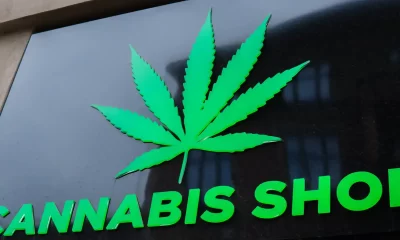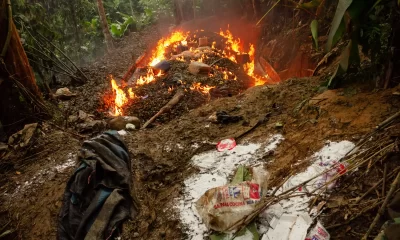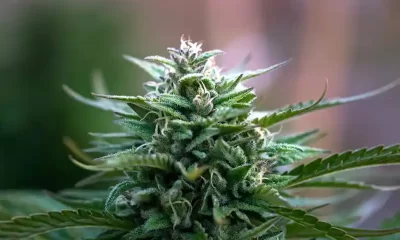Government
South Dakota Reservation Bans Alcohol, Allows Cannabis

Residents of a South Dakota reservation that voted to legalize cannabis and keep alcohol blacklisted are happy with the decision a few years in.
One South Dakota reservation, the Pine Ridge Indian Reservation, allows legal cannabis, though they still ban alcohol from within the reservation borders.
In 2020, the Oglala Sioux Tribe overwhelmingly voted to legalize recreational and medical cannabis. The site has banned alcohol for the last 100 years, and they aren’t planning to change that anytime soon. Cannabis was legalized in 2020, but some of the structure was delayed thanks to the pandemic. Now, they have a thriving industry. However, when they legalized cannabis they also had the option to make alcohol legal on the reservation again, and chose not to.
Folks who live on the South Dakota reservation claim that they see cannabis as a safe and natural alternative to alcohol and a tool for managing things like mental health issues and chronic illnesses. They still see alcohol as something that can impact not only health and safety but also life expectancy.
“Cannabis is a natural plant that comes from the Earth—and our people lived off the land, and they got their medicine from the land,” Ann Marie Beane tells Press Herald from a local dispensary called No Worries. “Our Indigenous people, they suffer a lot from diabetes and cancer and various other illnesses, but the cannabis really helps them.”
Shoppers at the store also shared that they feel alcohol, meth, opioids, and other illegal drugs are more dangerous than cannabis, and that cannabis is different and better for their community.
The Pine Ridge Reservation was established in 1889 and takes up 2 million acres and several small towns. It also comprises ranches, prairies, and badland formations. About 20,000 people live on the Reservation, and community members say some folks may not be counted by the U.S. Census Bureau and there are actually closer to 40,000 residents.
Throughout the history of the South Dakota reservation, alcohol has been illegal almost the entire time, but bootlegging is still common, and alcohol abuse is still an issue on the reservation.
“It’s killing our youth—It’s killing our future generation,” Beane says about the still-prevalent alcohol abuse problem.
The Oglala Sioux Tribe filed a 2012 lawsuit alleging that about 25% of children born on the reservation had health or behavioral problems caused by exposure to alcohol in the womb. They sued beer stores across the border in Nebraska that they claimed were taking advantage of folks with alcohol problems who lived on the reservation.
Indigenous people usually have a lower life expectancy and higher rates of health problems, which medical experts say are due to poverty and the harm their communities have been caused by the federal government. Reservations often lack good access to healthcare and healthy food. They are usually serviced by a group called the Indian Health Service, which is underfunded and not always able to provide the best care.
Of the customers polled at No Worries by the Press Herald, only a few of them said they only use cannabis for recreational purposes. Most of them use it for things like anxiety and pain, as well as other medical conditions. Reporters saw a patient with an ostomy bag who had lost part of her intentions, as well as patients who suffered drug addiction and cancer.
“I’d rather smoke than do other drugs because I almost gave up on my kids,” says Chantilly Little, a recovering addict.
“Unfortunately, the health care services provided by the Indian Health Service have failed so many in countless ways,” says Stephanie Bolman, a breast cancer patient who used to work in health care. She also serves on the city council for the Lower Brule Sioux Tribe. “It has left many to fend for themselves and endure so much pain and suffering that medical marijuana has proven to be lifesaving.”
While the folks on the Pine Ridge Indian Reservation, and many Indigenous people in South Dakota, are still struggling with lack of access to healthcare and social services and equity, legal cannabis access is a positive first step for them, as well as a clear alternative to alcohol.
Source: https://hightimes.com/news/south-dakota-reservation-bans-alcohol-allows-cannabis/
Business
New Mexico cannabis operator fined, loses license for alleged BioTrack fraud

New Mexico regulators fined a cannabis operator nearly $300,000 and revoked its license after the company allegedly created fake reports in the state’s traceability software.
The New Mexico Cannabis Control Division (CCD) accused marijuana manufacturer and retailer Golden Roots of 11 violations, according to Albuquerque Business First.
Golden Roots operates the The Cannabis Revolution Dispensary.
The majority of the violations are related to the Albuquerque company’s improper use of BioTrack, which has been New Mexico’s track-and-trace vendor since 2015.
The CCD alleges Golden Roots reported marijuana production only two months after it had received its vertically integrated license, according to Albuquerque Business First.
Because cannabis takes longer than two months to be cultivated, the CCD was suspicious of the report.
After inspecting the company’s premises, the CCD alleged Golden Roots reported cultivation, transportation and sales in BioTrack but wasn’t able to provide officers who inspected the site evidence that the operator was cultivating cannabis.
In April, the CCD revoked Golden Roots’ license and issued a $10,000 fine, according to the news outlet.
The company requested a hearing, which the regulator scheduled for Sept. 1.
At the hearing, the CCD testified that the company’s dried-cannabis weights in BioTrack were suspicious because they didn’t seem to accurately reflect how much weight marijuana loses as it dries.
Company employees also poorly accounted for why they were making adjustments in the system of up to 24 pounds of cannabis, making comments such as “bad” or “mistake” in the software, Albuquerque Business First reported.
Golden Roots was fined $298,972.05 – the amount regulators allege the company made selling products that weren’t properly accounted for in BioTrack.
The CCD has been cracking down on cannabis operators accused of selling products procured from out-of-state or not grown legally:
- Regulators alleged in August that Albuquerque dispensary Sawmill Sweet Leaf sold out-of-state products and didn’t have a license for extraction.
- Paradise Exotics Distro lost its license in July after regulators alleged the company sold products made in California.
Golden Roots was the first alleged rulebreaker in New Mexico to be asked to pay a large fine.
Source: https://mjbizdaily.com/new-mexico-cannabis-operator-fined-loses-license-for-alleged-biotrack-fraud/
Business
Marijuana companies suing US attorney general in federal prohibition challenge

Four marijuana companies, including a multistate operator, have filed a lawsuit against U.S. Attorney General Merrick Garland in which they allege the federal MJ prohibition under the Controlled Substances Act is no longer constitutional.
According to the complaint, filed Thursday in U.S. District Court in Massachusetts, retailer Canna Provisions, Treevit delivery service CEO Gyasi Sellers, cultivator Wiseacre Farm and MSO Verano Holdings Corp. are all harmed by “the federal government’s unconstitutional ban on cultivating, manufacturing, distributing, or possessing intrastate marijuana.”
Verano is headquartered in Chicago but has operations in Massachusetts; the other three operators are based in Massachusetts.
The lawsuit seeks a ruling that the “Controlled Substances Act is unconstitutional as applied to the intrastate cultivation, manufacture, possession, and distribution of marijuana pursuant to state law.”
The companies want the case to go before the U.S. Supreme Court.
They hired prominent law firm Boies Schiller Flexner to represent them.
The New York-based firm’s principal is David Boies, whose former clients include Microsoft, former presidential candidate Al Gore and Elizabeth Holmes’ disgraced startup Theranos.
Similar challenges to the federal Controlled Substances Act (CSA) have failed.
One such challenge led to a landmark Supreme Court decision in 2005.
In Gonzalez vs. Raich, the highest court in the United States ruled in a 6-3 decision that the commerce clause of the U.S. Constitution gave Congress the power to outlaw marijuana federally, even though state laws allow the cultivation and sale of cannabis.
In the 18 years since that ruling, 23 states and the District of Columbia have legalized adult-use marijuana and the federal government has allowed a multibillion-dollar cannabis industry to thrive.
Since both Congress and the U.S. Department of Justice, currently headed by Garland, have declined to intervene in state-licensed marijuana markets, the key facts that led to the Supreme Court’s 2005 ruling “no longer apply,” Boies said in a statement Thursday.
“The Supreme Court has since made clear that the federal government lacks the authority to regulate purely intrastate commerce,” Boies said.
“Moreover, the facts on which those precedents are based are no longer true.”
Verano President Darren Weiss said in a statement the company is “prepared to bring this case all the way to the Supreme Court in order to align federal law with how Congress has acted for years.”
While the Biden administration’s push to reschedule marijuana would help solve marijuana operators’ federal tax woes, neither rescheduling nor modest Congressional reforms such as the SAFER Banking Act “solve the fundamental issue,” Weiss added.
“The application of the CSA to lawful state-run cannabis business is an unconstitutional overreach on state sovereignty that has led to decades of harm, failed businesses, lost jobs, and unsafe working conditions.”
Business
Alabama to make another attempt Dec. 1 to award medical cannabis licenses

Alabama regulators are targeting Dec. 1 to award the first batch of medical cannabis business licenses after the agency’s first two attempts were scrapped because of scoring errors and litigation.
The first licenses will be awarded to individual cultivators, delivery providers, processors, dispensaries and state testing labs, according to the Alabama Medical Cannabis Commission (AMCC).
Then, on Dec. 12, the AMCC will award licenses for vertically integrated operations, a designation set primarily for multistate operators.
Licenses are expected to be handed out 28 days after they have been awarded, so MMJ production could begin in early January, according to the Alabama Daily News.
That means MMJ products could be available for patients around early March, an AMCC spokesperson told the media outlet.
Regulators initially awarded 21 business licenses in June, only to void them after applicants alleged inconsistencies with how the applications were scored.
Then, in August, the state awarded 24 different licenses – 19 went to June recipients – only to reverse themselves again and scratch those licenses after spurned applicants filed lawsuits.
A state judge dismissed a lawsuit filed by Chicago-based MSO Verano Holdings Corp., but another lawsuit is pending.
Source: https://mjbizdaily.com/alabama-plans-to-award-medical-cannabis-licenses-dec-1/
-

 Business2 years ago
Business2 years agoPot Odor Does Not Justify Probable Cause for Vehicle Searches, Minnesota Court Affirms
-

 Business2 years ago
Business2 years agoNew Mexico cannabis operator fined, loses license for alleged BioTrack fraud
-

 Business2 years ago
Business2 years agoAlabama to make another attempt Dec. 1 to award medical cannabis licenses
-

 Business2 years ago
Business2 years agoWashington State Pays Out $9.4 Million in Refunds Relating to Drug Convictions
-

 Business2 years ago
Business2 years agoMarijuana companies suing US attorney general in federal prohibition challenge
-

 Business2 years ago
Business2 years agoLegal Marijuana Handed A Nothing Burger From NY State
-

 Business2 years ago
Business2 years agoCan Cannabis Help Seasonal Depression
-

 Blogs2 years ago
Blogs2 years agoCannabis Art Is Flourishing On Etsy













